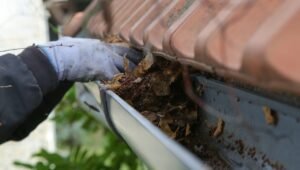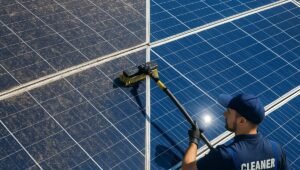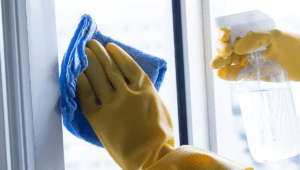
As solar energy becomes increasingly popular among homeowners and businesses alike, the focus has shifted from just installation to ongoing maintenance. One of the most commonly overlooked aspects? Solar Panel Cleaners. But does it make a difference? In short, yes, it does. Clean panels can significantly boost your system’s energy efficiency and help you get the most out of your investment. At Glass Shine Pros, we’ve seen firsthand how proper maintenance transforms solar performance. Let’s explore why.
Why Clean Solar Panels Matter for Performance
Your solar panels sit outside all day, every day. That means they’re constantly exposed to the elements—dust, dirt, leaves, bird droppings, pollen, air pollution, and even snow. Over time, this debris can accumulate on the surface of the panels, forming a layer that blocks sunlight from reaching the photovoltaic cells.
Think of your solar panels like windows to the sun. When these “windows” get dirty, less light gets through. The photovoltaic cells underneath can only convert the sunlight they actually receive into electricity. When that sunlight is blocked by a layer of grime, your energy production suffers noticeably.
In desert regions, dust alone can reduce efficiency within just a few weeks after rainfall. In agricultural areas, pollen and organic matter create a stubborn film that’s difficult to remove without proper cleaning techniques. Urban pollution creates a grimy layer that becomes increasingly problematic over time.
The Efficiency Problem
According to studies, soiling can reduce solar panel output by 15% to 30%, depending on your environment. Panels near busy roads, factories, or construction zones tend to accumulate more grime faster than those in cleaner, rural areas.
This efficiency loss isn’t linear, either. As dirt accumulates, the reduction in performance accelerates. What might start as a 5% loss can quickly grow to 25% or more if left untreated. Bird droppings are particularly problematic—these concentrated spots can create “hot spots” on panels that not only block light but can actually damage the panel over time.
Long-Term Financial Impact
You might think the drop in efficiency is minor, but over a year or two, that loss adds up in your energy bills and ROI. Regular cleaning ensures your panels operate as intended, delivering maximum energy output for your home or business.
Consider this: if your solar system normally produces $1,200 worth of electricity annually, a 20% reduction from soiling means you’re losing $240 every year. Over the 25-30 year lifespan of your system, that’s thousands of dollars in lost production—far more than the cost of regular maintenance.
Moreover, many solar systems are financed based on projected returns. If your system isn’t producing as expected due to dirt and grime, you may not be achieving the financial benefits you counted on when making your investment decision.
DIY vs. Professional Solar Panel Cleaning: What’s More Effective?
When it comes to cleaning your solar panels, you’ve got two options: do it yourself or hire a professional. Each method has its pros and cons.
DIY Solar Panel Cleaning
Pros:
- Cost-effective (just your time and a few basic tools)
- Convenient if panels are ground-mounted and easily accessible
- Can be done on your schedule
Cons:
- Risk of scratching or damaging the panels
- Not safe for steep or roof-mounted systems
- May not remove tough stains or grime completely
- Risk of voiding warranties with improper techniques
To clean your panels safely, use:
- A soft brush or sponge
- Mild, biodegradable soap
- Deionized or distilled water (to avoid mineral spots)
- A non-abrasive squeegee for drying
The best time for DIY cleaning is early morning or evening when panels are cool. Hot panels can crack if suddenly hit with cool water, and cleaning solutions dry too quickly in direct sunlight, potentially leaving residue behind.
Professional Solar Panel Cleaning
Pros:
- Safe and thorough
- Professionals use specialized equipment and pure water
- May include inspections for panel issues or wiring problems
- Trained technicians know how to work around system components
- Often includes a performance guarantee
Cons:
- Costs between $100 to $300, depending on size and location
- May require scheduling in advance
When you hire professionals like our team at Glass Shine Pros’ solar panel cleaning service, you’re not just paying for cleaning—you’re investing in expertise. Professional cleaners understand the nuances of different panel types and can spot potential issues before they become costly problems.
In general, homeowners with hard-to-reach panels or large systems benefit more from hiring professionals. If your system is on a steep roof or multiple stories high, the safety factor alone makes professional service worth considering.
Best Tools and Products that Solar Panel Cleaners Use
Whether you’re going the DIY route or just curious about how professionals do it, it’s helpful to know what works best.
Recommended Cleaning Tools:
- Telescoping poles with soft brush heads
- Non-abrasive sponges and squeegees
- Deionized water system or garden hose with gentle spray
- Biodegradable, ammonia-free soap
- Microfiber cloths for detailed cleaning (especially for edge areas)
Avoid:
- Pressure washers (even low pressure can damage seals)
- Abrasive cleaning pads or brushes
- Harsh detergents or chemicals with ammonia
- Metal tools that could scratch glass
- Hard water that leaves mineral deposits
Professional services typically use pure water systems that filter out minerals, resulting in a spot-free finish without the need for detergents. These systems are particularly effective and environmentally friendly, leaving no chemical residue behind.
Automation for Larger Systems
For commercial or large residential installations, robotic solar panel cleaners are gaining popularity. These systems use sensors, soft rollers, and water-efficient cleaning methods to remove debris without damaging the panels. They’re especially useful in areas with heavy dust or limited rainfall.
Some of these automated systems can be programmed to clean panels at optimal intervals, ensuring consistent performance without regular human intervention. While the initial investment is significant, the long-term benefits for large installations can make them cost-effective.
How Often Should You Clean Solar Panels for Maximum Efficiency?
Cleaning frequency depends on multiple factors, including weather, pollution levels, location, and even the tilt of your panels. A flat panel in a dusty, arid environment will get dirtier faster than a sloped panel in a rainy climate.
General Guidelines:
- Every 6 months for urban or dusty environments
- Annually for rural or cleaner regions
- After storms or wildfire events
- When output drops unexpectedly
- Quarterly in extremely dusty or high-pollen areas
For homeowners in our service areas, we typically recommend bi-annual cleanings, with adjustments based on your specific location and environmental conditions.
Signs Your Panels Need Cleaning:
- Noticeable drop in energy production
- Visible dirt, bird droppings, or tree sap
- You live near construction sites, highways, or industrial zones
- Recent weather events like dust storms or heavy pollen season
Tip: Monitor your energy output via your solar monitoring app. If you see an unexplained decline, dirty panels might be the culprit.
According to research from the National Renewable Energy Laboratory, regular cleaning can improve annual energy output by an average of 3.5% to 5% in typical environments and up to 30% in particularly dusty regions. This makes regular maintenance one of the most cost-effective ways to optimize your solar investment.
Frequently Asked Questions (FAQs)
1. Do solar panels really need to be cleaned regularly? Yes. Without regular cleaning, solar panels can lose up to 30% of their energy output due to debris buildup. Even in areas with regular rainfall, certain types of dirt and grime will still accumulate and require proper cleaning.
2. Can I clean solar panels myself without damaging them? You can, but caution is key. Use soft brushes and mild soap. Never use high-pressure hoses or abrasive cleaners, and avoid cleaning on hot, sunny days. Always follow manufacturer guidelines to maintain warranty coverage.
3. How much does it cost to hire a solar panel cleaning service? Costs typically range from $100 to $300, depending on roof access, system size, and location. Some services also offer annual maintenance packages that provide better value for regular cleaning.
4. Is rainwater enough to keep solar panels clean? Rain helps rinse light dust but won’t remove sticky grime like bird droppings or pollen. It’s helpful but not a replacement for cleaning. Additionally, rain often leaves mineral deposits behind as it dries, which can create new efficiency problems.
5. What’s the best time of year to clean solar panels? Spring and fall are ideal. Spring removes pollen and dust from winter, while fall prepares your system for low-light winter days when every bit of efficiency counts the most.
Conclusion: So, Do Solar Panel Cleaners Boost Efficiency?
Absolutely. Clean solar panels perform better, last longer, and provide greater returns on your investment. Whether you handle the job yourself or bring in the pros, regular maintenance is essential. Don’t let dirt block your sunlight—or your savings.
For professional solar panel cleaning that guarantees results, consider reaching out to our team at Glass Shine Pros. We combine industry expertise with cutting-edge cleaning techniques to ensure your solar investment continues to shine bright for years to come.
Remember: your solar panels represent a significant investment in sustainable energy. Protecting that investment with proper maintenance isn’t just good for the environment—it’s good for your wallet too.



